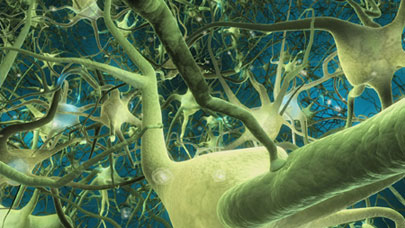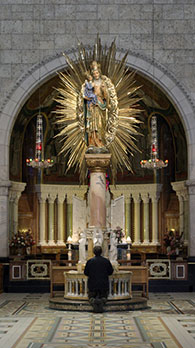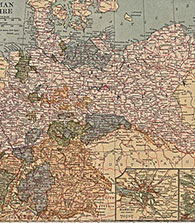Around campus
Redpath Roundup: Blurring the lines between fact and fiction

On Jan. 20, all are welcome to watch What the Bleep Do We Know?!, a controversial 2004 film that combines documentary interviews and a fictional narrative to posit a connection between science and spirituality while exploring topics such as neurology, quantum physics, psychology, epistemology, ontology, metaphysics, magical thinking and spirituality. Part of the Redpath's Super Science Documentary Film series, the movie has received widespread criticism from the scientific community with many claiming it grossly misrepresents the meaning of various principles of quantum mechanics and is, in fact, pseudoscience.
What the Bleep Do We Know?!; Jan 20; 4:00 p.m.; Redpath Museum auditorium; 859 Sherbrooke West; Admission: free with donation to museum. Information: Ingrid Birker at 514-398-4086 (ext. 4094) or at ingrid.birker@mcgill.ca. Complete Super Science Documentary schedule
Be on the cutting edge this year

iStock photo
Is one of your New Year's resolutions to be smarter? Then it sounds as though you should take in the upcoming installment of the "Cutting Edge Lecture Series," organized by the Royal Society of Canada and McGill University with the express purpose of fostering communication between scientists in different disciplines as well as between scientists and the public. On Jan. 10, Dr. Lee Smolin (Perimeter Institute of Theoretical Physics, Waterloo, Ontario) will present "Using the universe as a microscope to search for the smallest units of space." He will discuss recent and ongoing astrophysical observations which probe the structure of space and time at the shortest possible distance scales. The lecture will be followed by a wine and cheese reception, which segues nicely to your other resolution to cut down on booze and fatty foods.
"Using the universe as a microscope to search for the smallest units of space;" Jan 10; 6:00 p.m.; Redpath Museum auditorium; 859 Sherbrooke West. Free admission; all are welcome. Information: contact Ingrid Birker at 514-398-4086 (ext. 4094) or by email at ingrid.birker@mcgill.ca.
Get your freak on

The Redpath's ever-popular Freaky Fridays series hits the New Year running, or at least ambling with a human-like gait, with André Costopoulos, Anthropology, presenting "Extreme survival: Hominids on the edge." Costopoulos will explore the selective pressures faced by early hominids living on environmental fringes. The lecture will be followed by a screening of the celluloid classic The Abominable Snowman of the Himalayas (1957), in which a kindly English botanist and a gruff American scientist lead an expedition in search of the legendary Yeti. Freaky Fridays is an ongoing public outreach program in which McGill scientists confront myths, debunk popular misconceptions and clarify science.
"Extreme survival: Hominids on the edge;" Jan. 11; 5:00 p.m.; Redpath Museum auditorium; 859 Sherbrooke West; Admission is free, but seating is limited. For Information, contact Ingrid Birker at 514-398-4086 (ext. 4094) or by email at ingrid.birker@mcgill.ca. Complete Freaky Fridays schedule
Celluloid transformation

The McGill Faculty of Medicine kicks off the 2008 edition of its popular "Films that Transform" series on Jan. 15 with a screening of La Neuvaine, a powerful film directed by Bernard Émond that explores the difficulty of retaining faith when faced with senseless violence and death. This moving film about a chance meeting between two strangers on individual journeys into the true meaning of belief touches upon such profound issues as how each of us defines faith and lets it guide our actions.
Designed to challenge viewers to explore how they can bolster their own wellness and balance, the film series serves as a forum for the public to explore the healing process with health care professionals. Following La Neuvaine, Tom Hutchinson, Director, McGill Programs in Whole Person Care, Krista Lawlor, palliative care physician at the MUHC and Émond, the film's director, will take part in a panel discussion in which audience members are encouraged to participate.
La Neuvaine; Jan. 15; 7:00 p.m.; Moyse Hall; 853 Sherbrooke West. Admission: $10, $5 for students and seniors. For reservations call 514-398-2298 or email wpc.oncology@mcgill.ca. Schedule of upcoming films
Lecture series spotlights Weimar Germany

Germany between the world wars was a country of huge contradictions. The country's first experiment with democracy, the Weimar Republic (1918-1933), ended in failure, staggering beneath the weight of reparations imposed by the Treaty of Versailles and giving way to the rise of Nazism. At the same time, the country was an international hub of intellectual and cultural activity, blazing trails in literature, philosophy, medicine, psychoanalysis, music, technology and the visual arts. The interdisciplinary lecture series, "Inscriptions of Modernity in Weimar Germany (Art, Science and Culture)," will encompass a range of topics including German literature and art between 1918—1945; the history of World War I; Weimar intellectual life, body culture and the mind and brain sciences in early 20th century Germany.
In the inaugural lecture, "Jews, other Germans and the fragility of the Weimar Republic: Breslau 1916-1930," Till van Rahden of the Université de Montréal will look not only at the important role Jewish artists and intellectuals played in shaping the Weimar culture but also at how they suffered with the rise of anti-Semitism following the Great War. The lecture will take place on Tuesday, Jan. 22 at 5:00 p.m.
Lectures will take place every second Tuesday at 5:00 p.m. beginning on Jan 22; Don Bates Seminar Room 101; Social Studies of Medicine; 3647 Peel. Open to public. Contact 514-398-4455 (ext. 2058).

